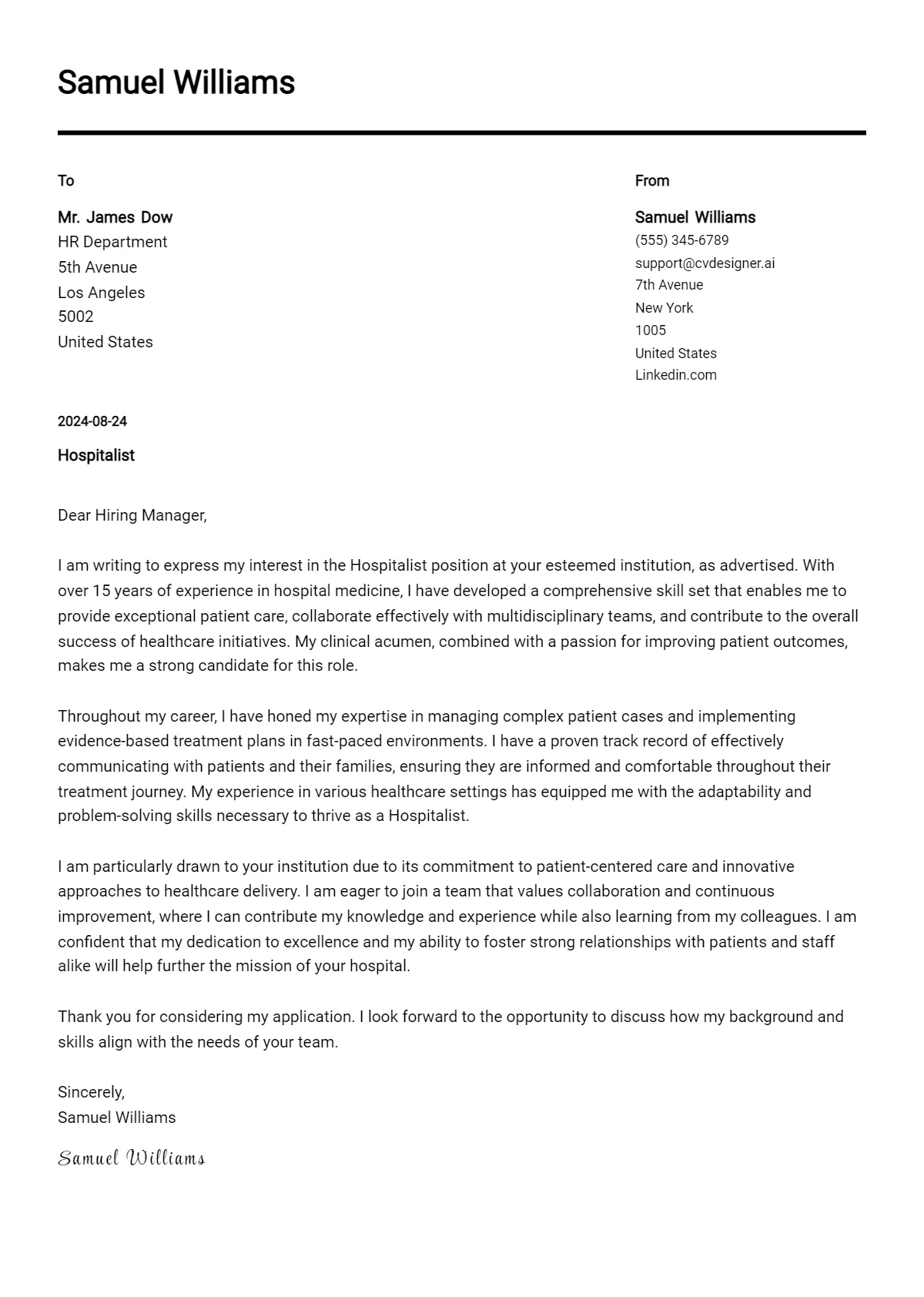What is a Cover Letter and Why is it Important for Hospital Jobs?
In the competitive landscape of hospital job applications, a well-crafted cover letter is your first opportunity to make a strong impression. A cover letter is a concise document that accompanies your resume, introducing you to the hiring manager and providing context to your qualifications. It’s more than just a formality; it’s a crucial tool for showcasing your personality, passion, and suitability for the role. A compelling cover letter allows you to expand on your experiences, highlight relevant skills, and demonstrate your understanding of the hospital’s specific needs. It is where you can truly differentiate yourself from other applicants, illustrating why you’re the ideal candidate for the position and why you are drawn to that particular hospital. Without a compelling cover letter, your resume might get lost in the pile, making it a vital component for securing an interview.
Key Components of a Strong Cover Letter
A strong cover letter comprises several key elements, each playing a vital role in presenting you as a highly qualified and enthusiastic candidate. These elements, when combined effectively, create a persuasive narrative that captures the hiring manager’s attention and encourages them to delve deeper into your application. From a professional header to a compelling closing, these components work together to highlight your key qualifications and passion for the role.
Header and Contact Information
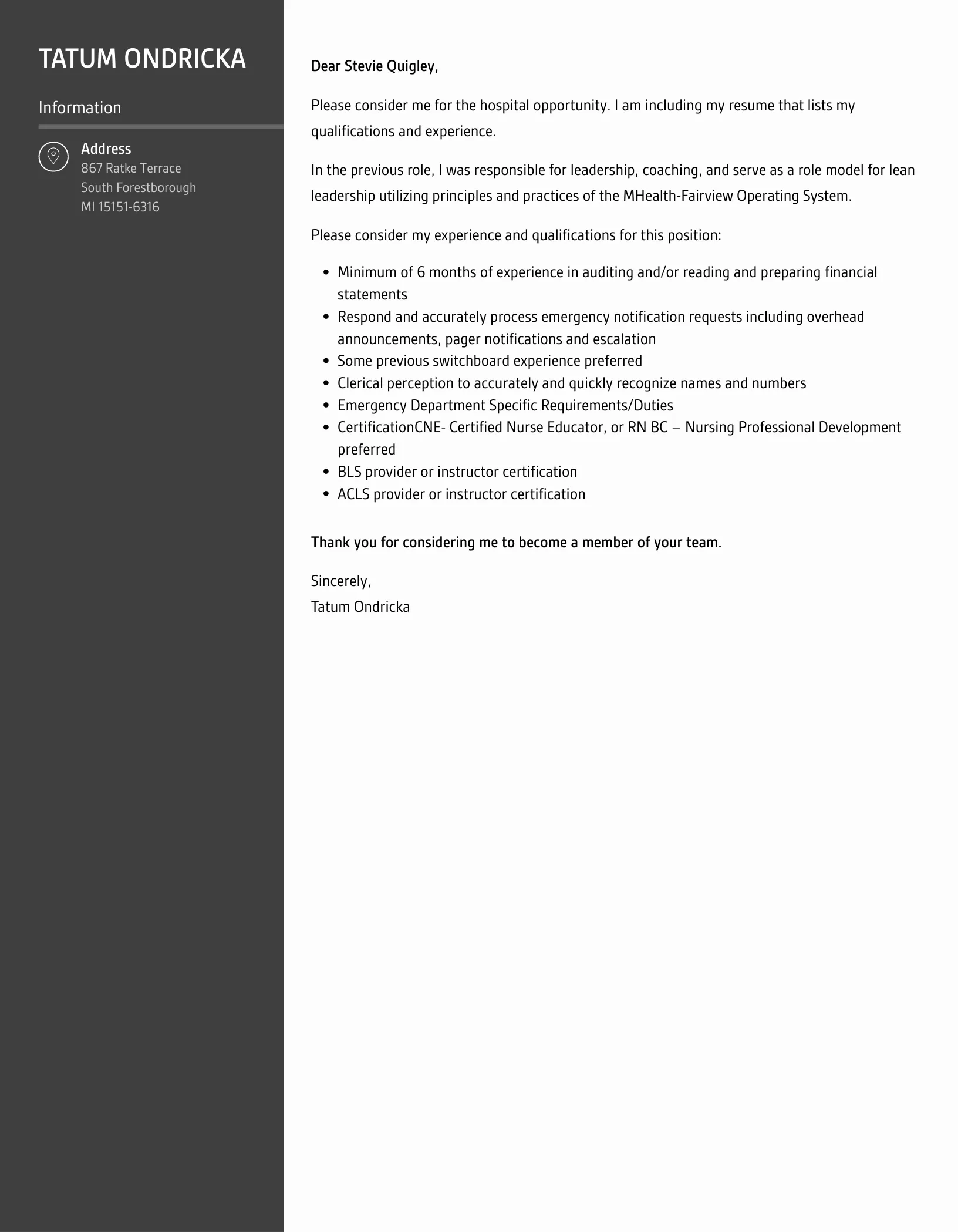
The header sets the professional tone of your cover letter. It should include your full name, contact details (phone number and professional email address), and the date. If known, include the hiring manager’s name and title. Use a professional and easily readable font, such as Arial or Times New Roman, and keep the formatting clean and uncluttered. Accurate and readily available contact information ensures the hiring manager can quickly reach you for an interview.
Greeting and Introduction
Start with a professional greeting, such as “Dear Mr./Ms./Dr. [Last Name]” or “Dear Hiring Manager” if you don’t have a specific name. Your introduction should immediately capture the reader’s attention. Briefly state the position you’re applying for and how you learned about it. This is where you can make a strong first impression by expressing your enthusiasm and briefly mentioning a key skill or experience that aligns with the job requirements. A strong opening creates an immediate connection and encourages the reader to continue reading.
Body Paragraphs
The body paragraphs are the core of your cover letter, where you demonstrate your value to the hospital. These paragraphs should focus on showcasing your relevant skills and experiences, providing specific examples to support your claims. Structure your paragraphs logically, using clear and concise language. Each paragraph should address a specific aspect of the job description, illustrating how your qualifications align with the hospital’s needs. Use action verbs and provide details to paint a clear picture of your abilities and achievements. This part should clearly state why you’re a great fit for the role.
Highlighting Relevant Skills and Experience
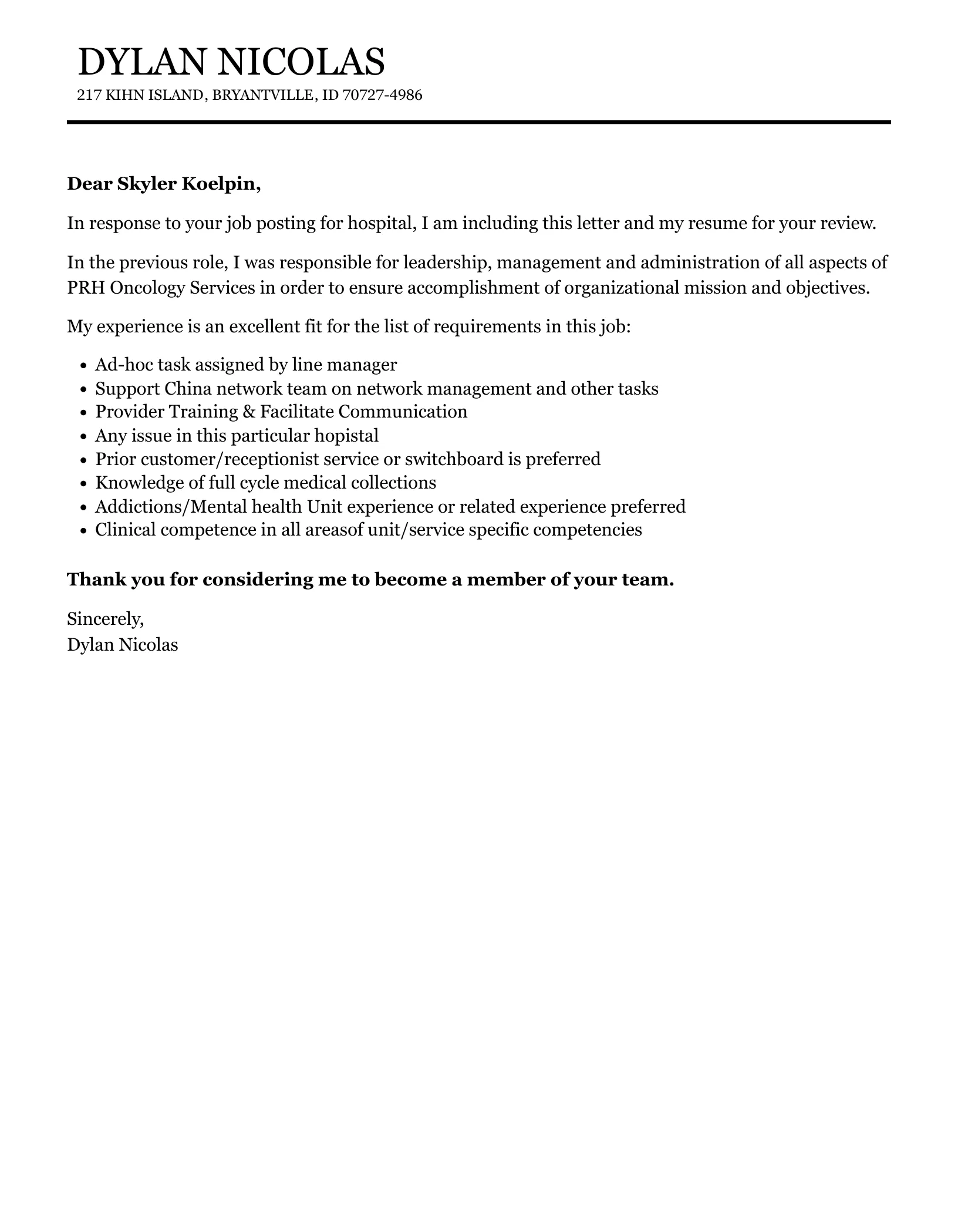
Carefully review the job description and identify the key skills and experiences the hospital is seeking. Focus on highlighting those aspects in your cover letter. Provide concrete examples from your past experiences, such as previous roles, volunteer work, or educational projects, where you successfully demonstrated those skills. Tailor your examples to match the hospital’s specific needs and requirements. Quantify your achievements whenever possible, providing data or metrics to showcase your impact and effectiveness. Highlighting relevant skills shows how your experience matches their needs.
Quantifying Achievements with Numbers
Whenever possible, quantify your achievements to provide concrete evidence of your success. Instead of stating that you “improved patient satisfaction,” provide data such as “increased patient satisfaction scores by 15%.” Use numbers and metrics to demonstrate the impact you had in previous roles. This shows your value and provides tangible evidence of your capabilities. By quantifying your accomplishments, you make your claims more credible and memorable.
Tailoring Your Cover Letter to the Hospital
Customizing your cover letter to each hospital you apply to is crucial. Generic cover letters are easily spotted and often discarded. The best way to impress is to research the hospital, understand its mission, values, and specific requirements for the role, then reflect your understanding in your cover letter. This level of personalization demonstrates your genuine interest in the organization and increases your chances of getting noticed.
Researching the Hospital’s Mission and Values
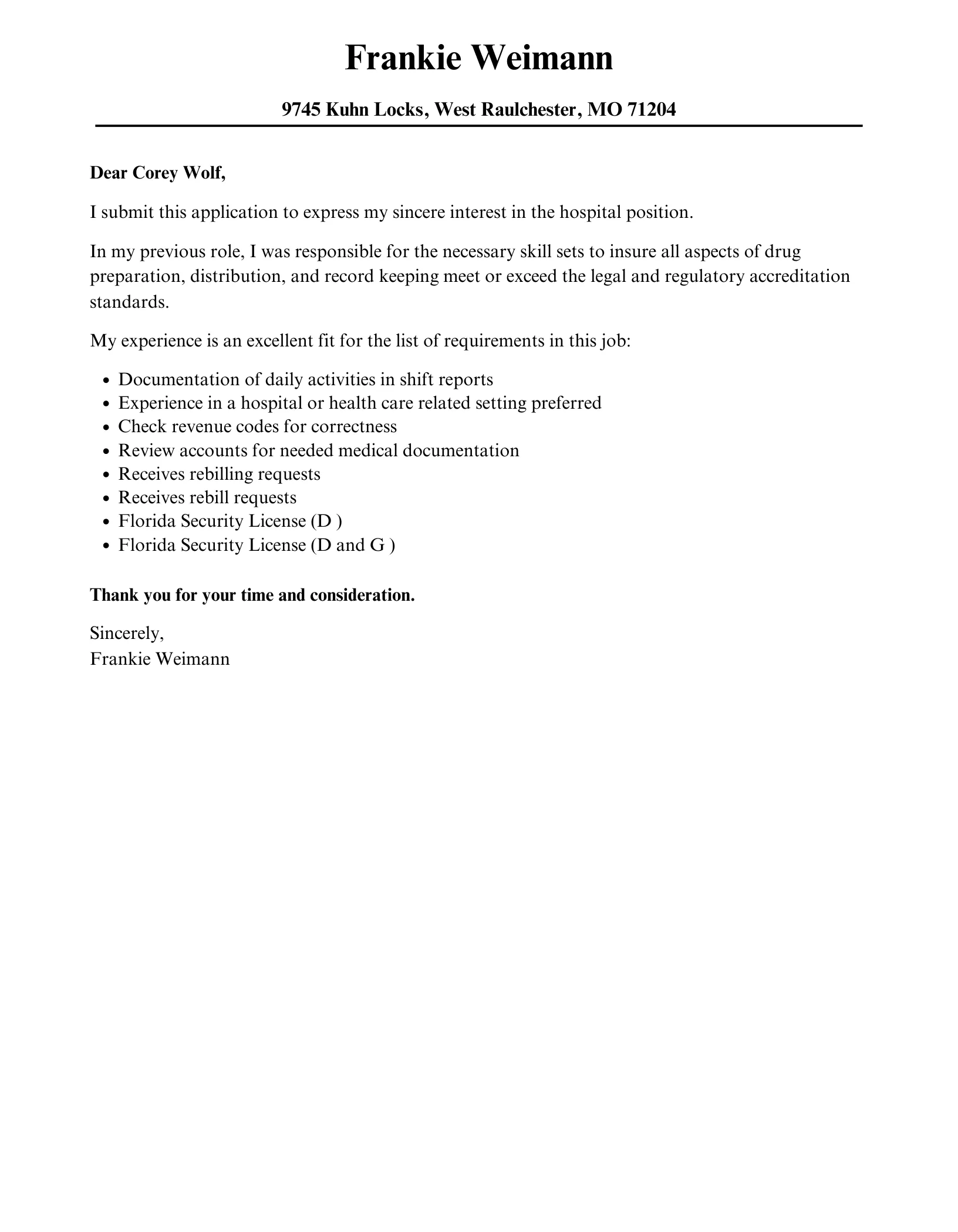
Before writing your cover letter, conduct thorough research on the hospital. Visit their website, read their mission statement, and understand their values. Identify their key priorities and any recent initiatives. Incorporate this information into your cover letter to show that you align with their goals. Discuss how your skills and experiences would help the hospital achieve its mission. Demonstrate that you understand their commitment to patient care, community involvement, or research.
Addressing Specific Job Requirements
Carefully analyze the job description and highlight the specific requirements. Address each requirement in your cover letter, providing relevant examples from your experience to show that you meet the qualifications. For example, if the job requires experience with electronic health records (EHR), provide specific examples of your experience with the software. Use keywords from the job description to demonstrate your understanding of the role. This demonstrates that you have carefully considered what the hospital is seeking.
Showcasing Your Passion for Healthcare
Express your genuine passion for healthcare in your cover letter. Highlight what motivates you to work in this field and what inspires you to contribute to patient care. Share your personal experiences that have shaped your interest in healthcare and explain why you are interested in working for that specific hospital. Enthusiasm is contagious, and showing your passion can make a lasting impression. This also makes it clear you’re genuinely interested in the role.
The Closing Paragraph
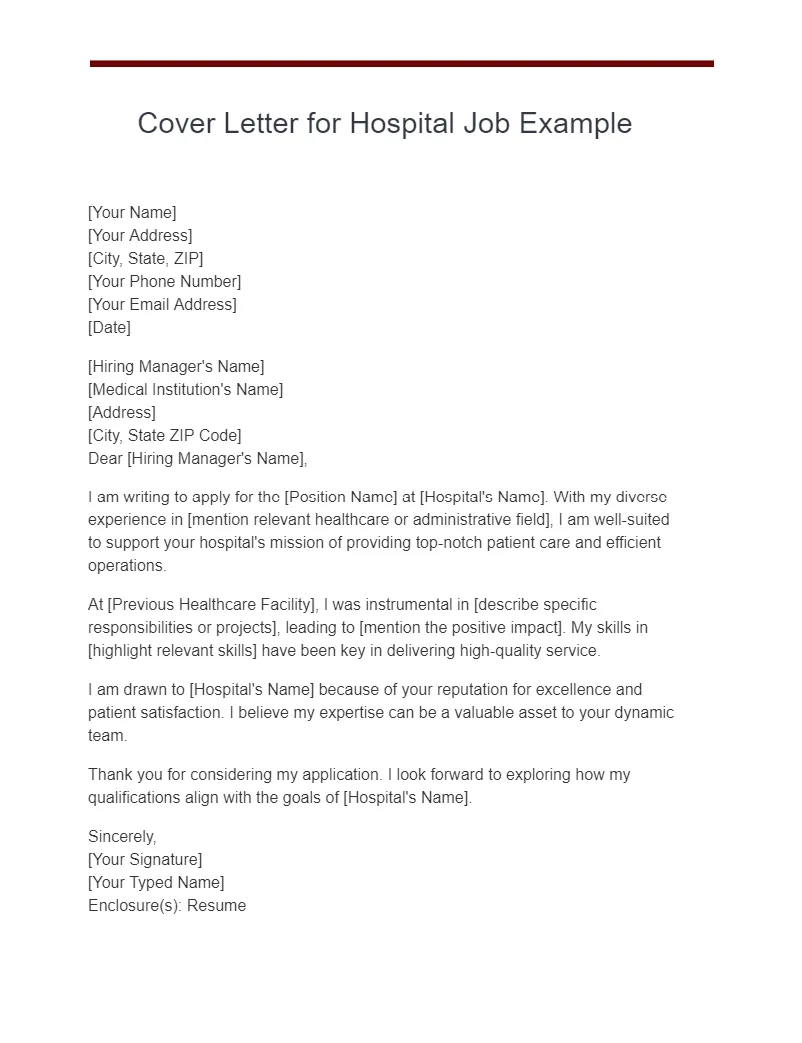
Your closing paragraph should reiterate your interest in the position, thank the hiring manager for their time and consideration, and include a call to action. Express your availability for an interview and provide your contact information again. Make it clear that you are eager to discuss your qualifications further. A strong closing leaves a lasting impression and encourages the hiring manager to take the next step.
Expressing Gratitude and Next Steps
Thank the hiring manager for their time and consideration. Reiterate your enthusiasm for the opportunity and your confidence in your ability to contribute to the hospital’s mission. Clearly state your availability for an interview and provide a way for them to contact you. This is a professional and courteous way to end the letter.
Formatting and Design Best Practices
Formatting and design elements play a crucial role in ensuring your cover letter is readable, professional, and visually appealing. Using correct formatting and design principles will make your application stand out. Avoid common pitfalls, such as poor layout or distracting fonts, to present yourself in the best possible light.
Font and Readability
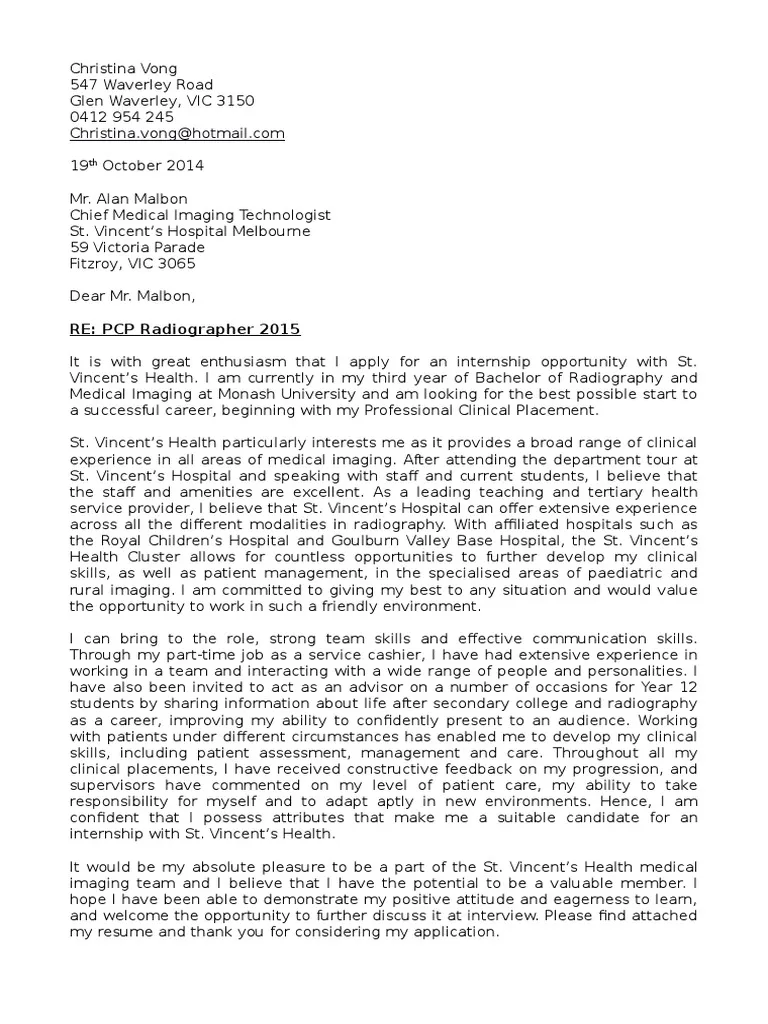
Choose a professional and easily readable font, such as Arial, Times New Roman, or Calibri. Use a font size between 10 and 12 points to ensure your text is clear and easy to read. Maintain consistent formatting throughout your cover letter, including consistent spacing, alignment, and margins. Avoid using fancy or overly stylized fonts that could distract the reader from your content.
Professional Tone and Language
Use a professional tone and language throughout your cover letter. Avoid slang, jargon, or overly casual language. Maintain a formal and respectful tone, showing that you take the application process seriously. Use clear and concise sentences, and avoid grammatical errors or typos. Present yourself as a competent and polished professional. Use active voice to showcase your accomplishments.
Proofreading and Editing
Proofread your cover letter carefully before submitting it. Check for any grammatical errors, spelling mistakes, or typos. Read your cover letter aloud to catch any awkward phrasing or unclear sentences. Ask a friend, family member, or career counselor to review your cover letter for feedback. A well-proofread cover letter shows that you pay attention to detail and take pride in your work.
Cover Letter Examples for Hospital Jobs
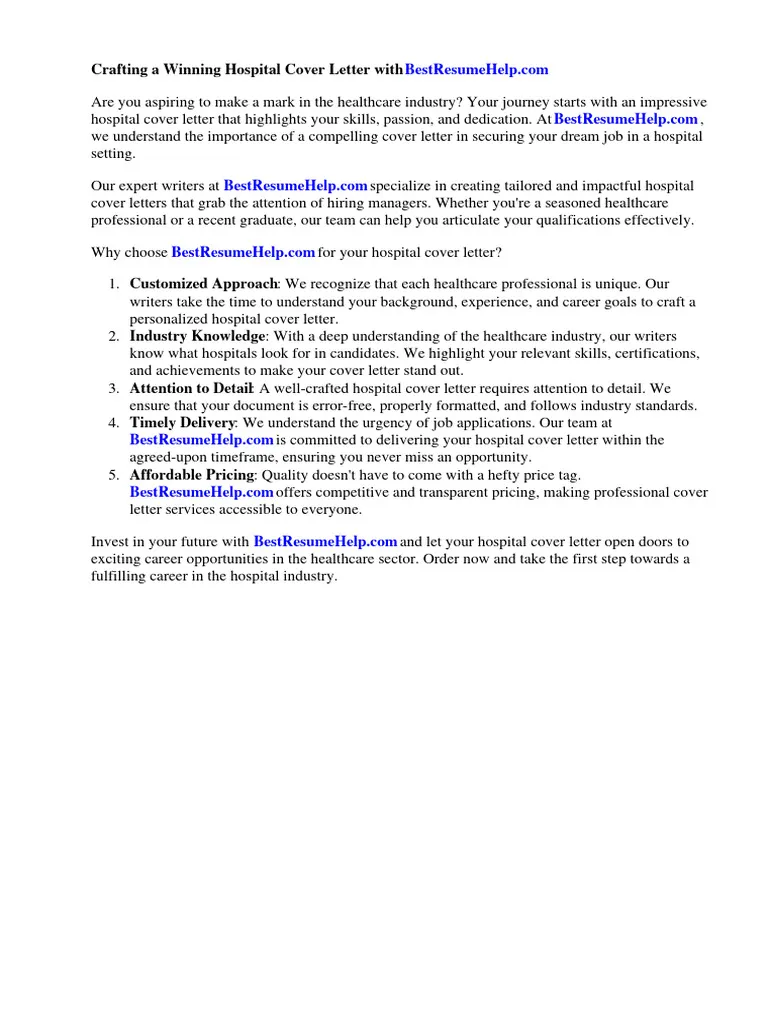
Reviewing cover letter examples tailored to specific hospital jobs can provide valuable insights into best practices and formatting. The following examples illustrate how to present your qualifications and tailor your letter to various roles. These examples demonstrate how to highlight relevant skills, quantify achievements, and express enthusiasm for the opportunity.
Example 1 Registered Nurse
Dear Hiring Manager, I am writing to express my interest in the Registered Nurse position at [Hospital Name]. With five years of experience in critical care, I am confident that I can provide exceptional patient care. I have experience in cardiac care, and my skills include monitoring patients, administering medications, and collaborating with interdisciplinary teams. In my previous role at [Previous Hospital], I was able to reduce patient readmission rates by 8% through implementing a new patient education program. I am passionate about ensuring patient safety and well-being and am particularly drawn to [Hospital Name]’s commitment to community health. I am eager to contribute my skills and experience to your team. Thank you for your consideration. I look forward to the opportunity to discuss my qualifications further. Sincerely, [Your Name].
Example 2 Medical Assistant
Dear [Hiring Manager Name], I am writing to apply for the Medical Assistant position at [Hospital Name], as advertised on [Platform]. I have three years of experience supporting physicians in a fast-paced clinic setting, including experience in patient intake, vital signs, and phlebotomy. I am proficient in electronic health records (EHR) and have a strong record of ensuring accuracy in medical documentation. I excel in patient communication, and I am eager to contribute to a patient-centered environment. I am excited about the opportunity to join [Hospital Name]’s team and support your mission. Thank you for considering my application. I can be reached at [Phone Number] or [Email Address]. Sincerely, [Your Name].
Example 3 Hospital Administrator
Dear [Hiring Manager Name], I am writing to express my keen interest in the Hospital Administrator position at [Hospital Name]. My background in healthcare management, including five years of experience in hospital operations and finance, makes me a strong candidate. In my previous role, I successfully managed budgets, streamlined operations, and implemented process improvements that increased efficiency by 12%. I am familiar with healthcare regulations and dedicated to ensuring compliance and excellence in patient care. I am very interested in the innovative strategies employed at [Hospital Name] and would welcome the chance to be a part of their administrative team. Thank you for your time and consideration. I can be reached via email at [Email Address] or by phone at [Phone Number]. Sincerely, [Your Name].
Tips for Writing an Effective Cover Letter
Following these tips can help you create a cover letter that stands out and effectively showcases your qualifications. Tailoring your letter, highlighting transferable skills, addressing gaps in employment, and preparing for rejection are all important aspects of the job application process. By implementing these strategies, you can significantly increase your chances of securing an interview.
Highlighting Transferable Skills
Even if you don’t have direct experience in a specific healthcare role, identify and highlight your transferable skills. These include skills such as communication, problem-solving, leadership, and teamwork. Provide examples of how you have demonstrated these skills in previous roles or experiences. Focus on how these skills align with the job requirements. For example, if the job requires strong communication skills, provide instances where you successfully communicated with patients, colleagues, or stakeholders.
Addressing Employment Gaps
If you have gaps in your employment history, address them honestly and positively. Briefly explain the reason for the gap, such as further education, travel, or personal commitments. Frame the gap in a way that demonstrates how you used the time constructively. You could have taken courses, volunteered, or gained valuable skills. Focus on how your experiences have strengthened your qualifications and prepared you for the role. Keep it brief, focusing on skills gained rather than the reasons behind it.
Dealing with Rejection
The job search process can be challenging, and rejection is common. Don’t let it discourage you. When you receive a rejection, analyze your application, and identify areas for improvement. Seek feedback from career counselors or trusted advisors. Revise your cover letter and resume as needed. Continue applying for positions and refine your approach. Remember that every application is a learning opportunity and can lead you closer to the desired career path. Persistence is essential when pursuing your dream job.
Final Thoughts and Resources
Writing a compelling cover letter is an essential step in securing your desired hospital job. By following these guidelines, using the provided examples, and continuously refining your approach, you can significantly increase your chances of success. Remember to tailor your cover letter to each specific job and hospital, highlighting your relevant skills and expressing your passion for healthcare. Resources include career counseling services, resume and cover letter templates, and job boards for healthcare professionals.
